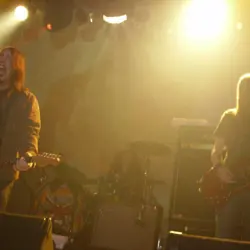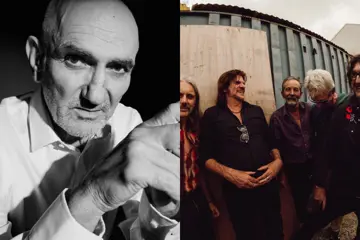 Monster Magnet
Monster MagnetWhen music becomes a viable full-time profession, for musicians the ageing process seems to stop. The endless playing and touring and everything that comes with it may be portrayed as a debaucherous lifestyle, but it's definitely one for the transients with bottomless reservoirs of energy and passion. New Jersey space rockers Monster Magnet have ridden the crest and fall of the industry as often as most, and yet here they are some 25 years since their humble beginnings in 1989, still churning out albums, still touring the world and, as Dave Wyndorf readily asserts, full of youthful vitality.
“We have been playing, on tour, planning to be on tour, planning to play, for as long back as I can remember. And it's always good to come home and chill for a while, but that can be hard too. When you are in a rock band, you don't have to constantly please people – that is bullshit. You have to arrive and blow 100 or 1,000 people's minds for an hour and a half, then split. I'm telling you, normal domestic life sounds way harder to maintain than a band's popularity. You only need to care about who's in front of you, and you really have to care, but then you leave them happy and you move on to the next group of people. It seems like I'm avoiding being an adult, but who would honestly want to be an adult?”
It's this fervent vitality that has allowed Monster Magnet to persevere. Having arrived fully formed at the dawn of the '90s as a sludge-rock band with a surreal space odyssey bent, the band found themselves cast into the fringes of mainstream limelight after songs like Negasonic Teenage Warhead and Space Lord found traction on MTV amidst the surge of popularity for music deemed to be in the Cult of Grunge. So when the world moved on, so did Monster Magnet. Now with nine albums under their belt, including the latest tour de force, Last Patrol, Wyndorf maintains there's no reason to think there will be an end point.
“It felt like I was making Spine Of God last week,” Wyndorf laughs. “You never feel time the way it really is anyway; memories either took place yesterday or a millennia ago. The thing about being in the same band and continually writing and playing, no matter whether you're popular or selling albums or are on the radio or not, is that you have a continuous body of work. You don't notice the ups and downs. All I ever wanted was to play music for a living, and that's what I did – can't get any better than this.”
Don't miss a beat with our FREE daily newsletter
Wyndorf's enthusiasm is infectious, and it goes a long way to explaining the Herculean feel of not just the band's legacy but Wyndorf's presence. Despite the stoner connotations that surround Monster Magnet or Wyndorf's publicised overdose on prescription drugs – or maybe because of them – it becomes clear that there's a fervent energy and active creativity at work with an endless burning fire at its core. The only way that this continues to be a driving passion is to work at it.
“I absolutely see [music] as work,” Wyndorf asserts. “When you find something you absolutely love and can't live without, you don't fuck around with that; you make sure that remains a constant forever. It's not working at a gas station; it's a responsibility. I think of Monster Magnet as 'the mission', and there are parts of the mission I don't like and there are parts that I love, but they all have to get done otherwise the mission fails. It makes me sound like a fanatic or like I'm in a cult – and music is that for most people I think.”
There's an innate feeling that comes with an extraordinary album; without realising it, it's clear this music has fused withyour DNA and will be a part of you for a long time. Last Patrol, without sounding particularly like Spine Of God or Dopes To Infinity, Monster Magnet's two most celebrated albums, holds much of the same inherent essence. Yet this is no return to form – it's merely a continuation of the sonic journey that Wyndorf is determined to see through to the end.
“The method is always the same for me, the work is always there. It's a method that I always return to. The chords and the key changes, they will always be similar because there are breaks that I just love to play. I only have so much inside me, so I go to the places that make me happy. I just want that oddness, weirdness, warts and all approach to music, with nothing left aside, nothing edited out, nothing left to chance. It's all or nothing, and I'm gonna take it all.”















